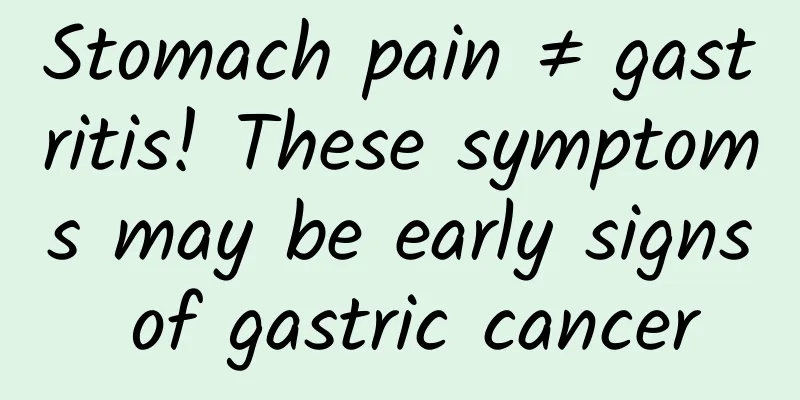Stomach pain ≠ gastritis! These symptoms may be early signs of gastric cancer

|
The full text is about 1,000 words, reading time: 5 minutes Stomach pain, acid reflux, bloating... These seemingly ordinary gastrointestinal discomforts are often mistaken for "gastritis" or "indigestion". However, as a high-incidence area of gastric cancer in the world (accounting for 40% of new cases), only 20% of early gastric cancer patients in China can be diagnosed in time, and most of the others miss the best treatment opportunity due to hidden symptoms. This article will deeply analyze the recognition logic of early gastric cancer signals and reveal the potential risks behind the symptoms. 1. Overlapping symptoms: Why is it difficult to distinguish between gastric cancer and gastritis? The symptoms of early gastric cancer and gastritis are highly similar, including upper abdominal pain, indigestion, acid reflux and belching. The core difference lies in the pathological mechanism: Gastritis: An inflammatory reaction of the gastric mucosa. Symptoms are often caused by abnormal gastric acid secretion or Helicobacter pylori infection. Anti-acid treatment is usually effective. Gastric cancer: Cancer cells invade and destroy the gastric mucosa and nerves, leading to persistent symptoms (such as fixed-location pain and ineffective drug relief) and accompanied by systemic abnormalities (such as anemia and weight loss). Key tip: If symptoms persist for more than a month or recur, be alert to the possibility of gastric cancer. 2. Hidden signs of gastric cancer: Which symptoms need to “sound the alarm”? 1. Sudden weight loss: A weight loss of more than 5% within 3 months may be due to tumor consumption or secretion of appetite suppressant factors. 2. Anemia: Chronic blood loss due to gastric cancer leads to pale complexion and bloodless nail beds, often accompanied by black stools or vomiting blood. 3. Difficulty swallowing: The tumor in the cardia compresses the esophagus, causing a feeling of obstruction behind the sternum. 4. Persistent indigestion: Common stomach problems can be relieved by taking medication for 2 weeks, but the symptoms of stomach cancer are stubborn. 5. Family history and superimposed symptoms: Those whose immediate relatives have gastric cancer have a 2-3 times increased risk and require earlier screening. 3. Portrait of high-risk groups: Who should be screened as early as possible? Men over 40 years old (the incidence rate increases with age); People infected with Helicobacter pylori (infection rate 55%, clear risk of cancer); People who have a long-term high-salt diet (salt intake exceeds the WHO standard by 2.4 times); Patients with a history of gastric mucosal atrophy, intestinal metaplasia or dysplasia (the cancerous process lasts up to 10-15 years). 4. Diagnosis and intervention: How to “break the impasse” of early detection? 1. Gastroscopy biopsy: The gold standard examination, which can detect millimeter-level lesions. 2. Biomarker detection: CLDN18.2, HER2 and other indicators help with precise classification and targeted treatment. 3. Molecular classification guides treatment: For HER2-positive patients, trastuzumab should be used to avoid blind chemotherapy. Data support: The 5-year survival rate of early-stage gastric cancer is over 90%, while that of late-stage gastric cancer is less than 20%. 5. Prevention strategy: a “full chain of defense” from diet to screening Dietary revolution: daily salt intake <5g, avoid hot food above 65℃ (Class 2A carcinogen); Eradication of Helicobacter pylori: The eradication rate of quadruple therapy is 85%-90%, and the risk of gastric cancer is reduced by 34%; Regular screening: high-risk groups should undergo gastroscopy every 1-2 years, and the general population should start after the age of 50. Conclusion: Stomach pain does not equal gastritis, but it may be a "silent warning" of gastric cancer. Facing the fog of overlapping symptoms, only scientific screening (such as gastroscopy) and high-risk factor management can help us see the light. A healthy lifestyle and regular physical examinations are the ultimate weapons against gastric cancer. Remember: every time you are alert to symptoms, you are responsible for your life. Data support: clinical guidelines |
<<: Are you more likely to have mood disorders in spring? These factors may be affecting you
>>: Why are more and more people suffering from allergies? It’s all because of them!
Recommend
Signs that a woman wants to cheat: Do you show these characteristics?
Cheating is a bad term, but at any time there wil...
World Pneumonia Day | Don't let chronic pneumonia drag down your body
Winter is the peak season for pneumonia, which ca...
How to treat fallopian tube cysts
Fallopian tube cyst is a very common disease of t...
The reason why you don't have a baby for several days
Many pregnant women become very nervous when they...
What to do if pregnant women have endocrine disorders
Pregnancy is a very hard thing. Pregnant women ne...
What does cervical hpv test mean
HPV, or human papillomavirus infection, is a DNA ...
Blood streaks after sex
We all know that sex is an indispensable activity...
What causes swollen feet during pregnancy?
It is quite common for pregnant women to experien...
"Academy of Agricultural Sciences delicacies" are popular, but the quality is not up to standard? The truth is here
In recent years, many netizens have discovered th...
How deep is a woman's vagina?
As a private part of women, the existence of the ...
How effective is fermented rice dumplings in breast enhancement?
Nowadays, many men care about a woman's breas...
Why does peanut oil have sediment? Why does peanut oil foam?
Peanut oil has a strong peanut flavor, and is ver...
Can I take donkey glue blood-replenishing granules during menstruation?
Many people know that women have to discharge a l...
What causes low testosterone?
Testosterone is a male steroid hormone that is ma...
What to do if you have swollen and painful hemorrhoids during pregnancy?
Many pregnant women will experience symptoms of h...









